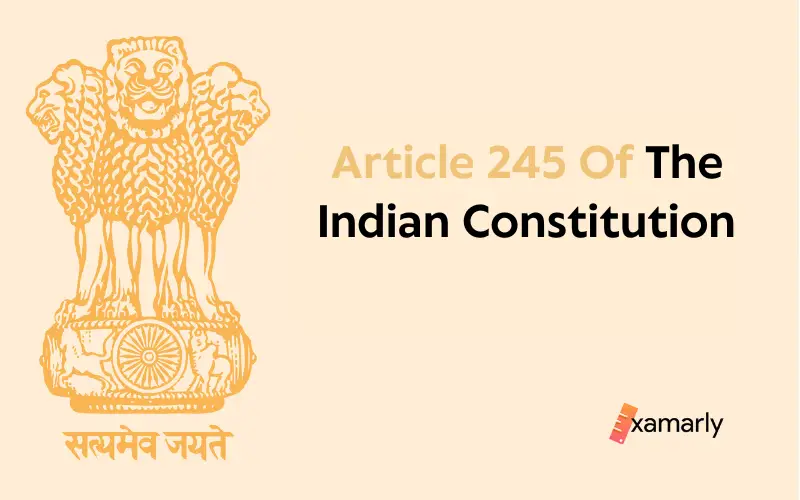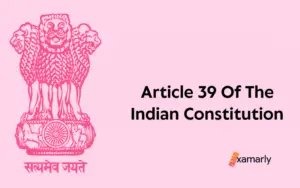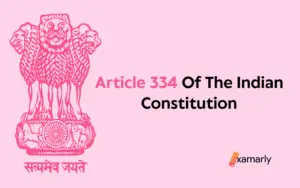Article 245 of the Indian Constitution addresses the breadth of the legislation passed by both the Parliament and the individual state legislatures. It not only grants Parliament the authority to enact laws but also grants the legislative body the authority to nullify those laws.
The said Article is covered in Chapter 1 of Part IX of the Indian Constitution. Here Chapter 1 deals with “Legislative Relations” and Part IX pertains to the “Relations Between The Union And The States.”
This page provides valuable insight into Article 245 of the Constitution of India.
What Is Article 245 Of The Indian Constitution?
Article 245 of the Indian Constitution addresses the extent of laws enacted by the Parliament and the Legislatures of States. The Constitutional provisions with respect to the Article stated before are outlined in two clauses. These are:
- Subject to the provisions of this Constitution, it is possible for Parliament to pass laws that apply to the entire territory of India or only a portion of it, and it is also possible for the legislature of a state to pass laws that apply to the entire state or just a portion of it.
- No enactment of Parliament shall be held to be null and void only because of its potential extraterritorial applicability.
Is Article 245 Absolute?
According to article 245, the parliament may enact legislation for all or a portion of the Indian territory, subject to the provisions of this constitution. India’s territory is made up of states, UTs, and other regions like enclaves. A key query is whether or not this authority is absolute. The answer is no since this article makes this power conditional and subject to this constitution. The following describes each of these conditions:
- The President has the authority to enact regulations for the UTs of Andaman and Nicobar Islands, Dadra and Nagar Haveli, Lakshadweep, and Daman and Diu. These regulations are intended to promote peace, progress, and good government. Such a rule is so strong that it has the ability to change or overturn legislation passed by parliament that also applies to these territories.
- The Governor has the authority to direct whether a certain parliamentary statute is applicable to a fifth schedule scheduled area or whether it is not applicable to such an area. The Governor is also entitled to direct whether or not such legislation can be applied with the appropriate alterations and exceptions.
- In the context of the sixth schedule states of Meghalaya, Mizoram, Assam, and Tripura, the Governor has the authority to direct whether or not a certain parliamentary statute is applicable, applicable with modifications, or partially applicable to an autonomous district of a tribal area.
As a result, the ability of parliament to enact legislation for all or a portion of the Indian subcontinent is not absolute and should be interpreted in light of other constitutional provisions. In a similar vein, the allocation of powers, fundamental rights, and any other relevant provisions should also be taken into account.
In the Interest of Further Readings:
| Fifth Schedule Of The Indian Constitution | Sixth Schedule Of The Indian Constitution |
| Article 253 Of The Indian Constitution | Article 254 Of The Indian Constitution |
Distribution Of The Legislative Powers With Respect To The Territory
According to article 245(1) of the Indian Constitution, parliament has the authority to enact laws that apply to all or a specific portion of India’s territory. In addition, Parliament possesses extraterritorial authority, allowing it to pass laws that cannot be revoked on the grounds that they have no bearing outside of India.
In the case of A.H. Wadia v. Income Tax Commissioner, it was ruled that an issue of the extraterritoriality of an enactment cannot ever be raised against a supreme legislative authority on the basis of doubting its legality. It might not adhere to international law’s norms, or it might encounter practical challenges when being enforced, but these are policy-related issues that are under the purview of the national or domestic tribunal.
What Is Extra-Territorial Operation?
The authority to enact laws both within India’s territorial boundaries and for extra-territorial purposes with a connection to India is granted to Parliament. Because it possesses the authority to do so, the parliament is responsible for enacting any legislation or laws that are relevant to the subject at hand. These laws’ legality cannot be contested. Any law passed by the parliament that has no connection to India will be deemed ultra vires and treated as if it were made for a different country.
In light of this, it may be said that no law passed by the parliament that has a real connection to India can be ruled unlawful or unconstitutional. If there is no connection to India, then such legislation passed by parliament is beyond its authority.
According to our constitution, the legislative authority granted to the parliament to create laws within the territorial jurisdiction as well as for other purposes allows it to recognize extraterritorial purposes and execute state or collective powers. According to the doctrine of public trust, all laws passed by parliament with regard to extraterritorial operations must be done so in order to protect India’s welfare and security. This directly implies that laws cannot be passed for extraterritorial operations if they have no connection to India.
When Article 245 Came Into Effect?
On June 13, 1949, a discussion was held over Draft Article 216, which later became Article 245 of the Constitution of India in 1950. It specified the respective territorial reach of laws passed by the State and Parliament legislatures. Regarding this Article, there was no substantial back-and-forth conversation.
On June 13, 1949, the draft Article 216 was approved for enactment.
Conclusion
It is possible to get the conclusion that one of the most important aspects of federalism is the division of powers that have been delegated to the centre and those that have been delegated to the states. This authority is divided by the constitution itself. The constitution creates a dual polity that includes both the union and the states. Laws pertaining to extraterritorial operations can be enacted by the parliament, but not by a state legislature. However, the parliament can enact laws pertaining to the entire country of India or a part thereof.
One caveat, however, allows such legislatures to make laws for extra-territorial operation so long as there is some connection between the subject and the state. This indicates that the claim could be upheld even if the subject of the claim is situated beyond the jurisdictional boundaries of the state, provided that the subject maintains a territorial link with the state. The territorial nexus theory permits the application of the law up to a country’s territory.
FAQs On Article 245
What Is The Doctrine Of Territorial Nexus?
With the exception of cases where there is a “sufficient nexus” between the state and the object, the laws passed by a state legislature are not binding outside of that state under the Doctrine of Territorial Nexus. The Indian Constitution’s Article 245 serves as the legal foundation for this doctrine. The doctrine stipulates that there must be a nexus between the object and the State for state legislation to have an extraterritorial operation.
What Is Article 245 of The Indian Constitution?
The extent of the authority that can be exercised by legislation enacted by state and federal legislatures is outlined in Article 245 of the Indian Constitution. It includes a provision that addresses the reach of laws that are enacted by state legislatures and the federal legislature. The legislative body now has the authority to both enact new laws and change already-existing ones.
What Is The Difference Between Article 245 And Article 246?
The scope of laws passed by the state legislatures and by Parliament is discussed in Article 245 of the Indian constitution. It grants the legislative body the authority to both enact and repeal laws through Parliament. The distribution of power between the Union and the States is laid out in detail in Article 246 of the Constitution. It separates the Union’s and the State’s authority by grouping those authorities into three lists. The Union List, the State List, and the Concurrent List are these.
Is The Power Of The Legislature Under Article 245 An Absolute Power?
Article 245 of the Constitution grants the legislature absolute authority to create laws, subject solely to its legislative authority and other constitutional restraints. Therefore, the power necessary to enact a law must contain the power to give it effect both prospectively and retroactively.






